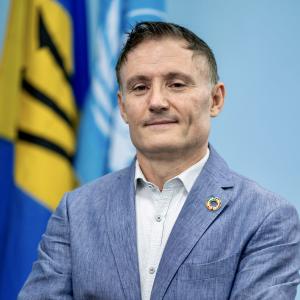ACKNOWLEDGEMENTS
- Hon. Premier Natalio Wheatley, British Virgin Islands
- Representatives of the Governor’s office (Katie Griffiths and Vicki Francis)
- Mr. Benito Wheatley, Special Envoy of the Premier
- Permanent Secretaries and other government officials including those from Anguilla, Aruba, Montserrat, and the UK Foreign, Commonwealth and Development Office
- Distinguished colleagues from the ECLAC, UNDP, in person. UNEP, UNICEF, WFP, ITU, IOM. Caribbean Development Bank,
- Ladies and Gentlemen
I'm honoured to welcome you today in the BVI as we gather for this crucial Policy Dialogue on development finance. I wanted so much to join you in person but my other trips and commitments prevented me to travel. I am so glad this event takes place, Premier, as we committed to recently.
This dialogue is especially timely, on the eve of the SIDS conference and following the IMF and World Bank Spring Meetings. Our discussions today will build on the solid foundation we laid during last year’s BVI-UN SD forum right here in the BVI, where we identified key priorities for sustainable development and UN support.
Our agenda today is more than necessary. It is urgent.
Urgent because many of the traditional solutions won't reach OTs due to their status and the monetary metrics that exist behind them. This is despite frequent extreme weather events, rising inequality and inflation, and a complex climate finance landscape.
The challenges facing overseas territories are well-understood but often overlooked.
While income metrics suggest development, OTs face similar issues to their Caribbean neighbours – high inequality and remaining poverty, as well as vulnerability to external shocks, (2022/2023 estimates stand at 24% in BVI, 36% in Montserrat).
Vulnerability was for example illustrated by the devastating impact of hurricanes Irma and Maria which resulted in losses amounting to 3.5 times the BVI's GDP and a staggering 97% of infrastructure loss in Anguilla, by the impact of COVID-19 pandemic and recent food, energy, and finance crises.
These figures are not just statistics; they represent communities disrupted, livelihoods destroyed, and ecosystems severely damaged.
So as global volatility is likely to continue, the urgency for exploring innovative financing solutions has never been greater for OTs.
It's clear that we must leverage every available resource, ensuring domestic efforts in resource mobilization are as effective as possible, while also pioneering non-traditional financing avenues to build our resilience with international support.
In doing so, we also recognize a significant barrier—the capacity to design, fund, and implement transformative development projects in SIDS. Enhancing this capacity is crucial, as is engaging the right stakeholders to ensure projects are not only viable but also catalyze further investment. This means improving public financial management and ensuring we capture all possible tax revenue.
Premier, we know that Climate finance, one of the largest pools of development funds, is notoriously difficult for Small Island Developing States (SIDS) to access. The UN and Development Partners have been working on simplifying access, but OTs may need alternative financing for adaptation, mitigation, and disaster preparedness. We are also actively supporting countries improving risk assessments, designing green and blue bonds and ensuring these tools are used to their fullest potential.
Finally, the UN with agencies like UNDP and ECLAC, is working closely with OT governments and DPs the UK Foreign, Commonwealth and Development Office to strengthen existing partnerships and forge new ones to bring innovative ideas for action. We will also hear more about that during today’s discussions.
I also want to look ahead to the SIDS Conference, the Summit of the Future, and next year’s Financing for Development Conference. Let me stress that these are not just meetings, but opportunities to reshape the global financial architecture, to advocate for financing that is affordable, dynamic, and equitable.
So let us be inspired by what we can achieve together here, because our actions here can set a precedent for dynamic, responsive financing models that empower communities to become more resilient.
Hon. Premier, government representatives, colleagues, rest assured that the UN stands committed to assisting you in overcoming these constraints.
I am encouraged by the turnout today and also by the support of our development partner, the United Kingdom’s Foreign, Commonwealth and Development Office, with whom we engaged in the organizing of this event.
I wish you successful deliberations today.









